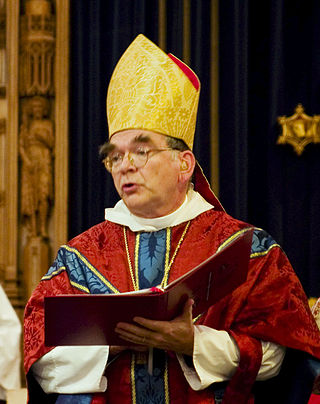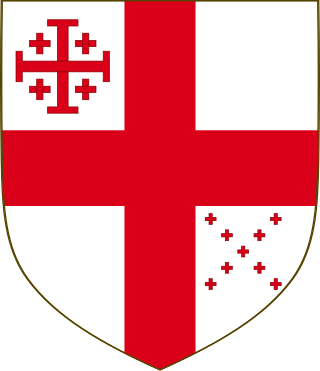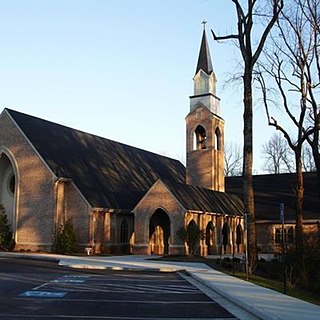Episcopacy
In 2001, Lyons was elected bishop of the Diocese of Bolivia, one of seven dioceses in the Anglican Church of the Southern Cone of America (now called The Anglican Church of South America). The diocese was very small; at the time of his election, it included only four parishes. [2] By 2012, that number had grown to eight. [6]
Lyons became known in the United States for providing oversight to theologically conservative Episcopal parishes who wished to break away from the Episcopal Church after its consecration of Gene Robinson as a bishop in 2003. By 2007, he oversaw as many as 40 parishes and was an active participant in the Anglican Church of the Southern Cone's role in the Anglican realignment. These U.S. parishes were known as the "Northern Deanery" of the Diocese of Bolivia. [4] [7]
In August 2012, Lyons accepted an appointment as assistant bishop in the Anglican Diocese of Pittsburgh. He supported Robert Duncan in his dual roles as diocesan bishop of Pittsburgh and archbishop of the Anglican Church in North America. [8] Lyons had a special assignment to oversee parishes outside of the Pittsburgh region. [7]
In January 2015, Lyons became assisting bishop in the Anglican Diocese of the South. He assists Archbishop Foley Beach in providing episcopal pastoral care and leadership including confirmations and ordinations, and leading the deans, along with other areas of leadership and care within the diocese. [1]
The Anglican Communion Network was a theologically conservative network of Anglican and Episcopalian dioceses and parishes in the United States that was working toward Anglican realignment and developed into the Anglican Church in North America.

Robert William Duncan is an American Anglican bishop. He was the first primate and archbishop of the Anglican Church in North America (ACNA) from June 2009 to June 2014. In 1997, he was elected bishop of the Episcopal Diocese of Pittsburgh. In 2008, a majority of the diocesan convention voted to leave the diocese and the Episcopal Church and, in October 2009, named their new church the Anglican Diocese of Pittsburgh. Duncan served as bishop for the new Anglican diocese until 10 September 2016 upon the installation of his successor, Jim Hobby.

The Anglican Diocese of Quincy is a member of the Anglican Church in North America, and is made up of 34 congregations in the states of Illinois, Wisconsin, Minnesota, Texas, Iowa, Nebraska, Missouri, Hawai'i, Colorado, Tennessee, and Florida, in the United States. The diocese was a founding member of the Anglican Church in North America in 2009.

The Anglican Church of South America is the ecclesiastical province of the Anglican Communion that covers six dioceses in the countries of Argentina, Bolivia, Paraguay, Peru, and Uruguay.

The Episcopal Diocese of Pittsburgh is a diocese in the Episcopal Church in the United States of America. Geographically, it encompasses 11 counties in Western Pennsylvania. It was formed in 1865 by dividing the Episcopal Diocese of Pennsylvania. The diocesan cathedral is Trinity Cathedral in downtown Pittsburgh. The Rt. Rev. Ketlen A. Solak was consecrated and seated as its current bishop in autumn 2021.

The Anglican ministry is both the leadership and agency of Christian service in the Anglican Communion. "Ministry" commonly refers to the office of ordained clergy: the threefold order of bishops, priests and deacons. More accurately, Anglican ministry includes many laypeople who devote themselves to the ministry of the church, either individually or in lower/assisting offices such as lector, acolyte, sub-deacon, Eucharistic minister, cantor, musicians, parish secretary or assistant, warden, vestry member, etc. Ultimately, all baptized members of the church are considered to partake in the ministry of the Body of Christ.

The history of the Episcopal Church in the United States of America has its origins in the Church of England, a church which stresses its continuity with the ancient Western church and claims to maintain apostolic succession. Its close links to the Crown led to its reorganization on an independent basis in the 1780s. In the nineteenth and early twentieth centuries, it was characterized sociologically by a disproportionately large number of high status Americans as well as English immigrants; for example, more than a quarter of all presidents of the United States have been Episcopalians. Although it was not among the leading participants of the abolitionist movement in the early 19th century, by the early 20th century its social engagement had increased to the point that it was an important participant in the Social Gospel movement, though it never provided much support for the Prohibitionist movement. Like other mainline churches in the United States, its membership decreased from the 1960s. This was also a period in which the church took a more open attitude on the role of women and toward homosexuality, while engaging in liturgical revision parallel to that of the Roman Catholic Church in the post Vatican II era.
The Anglican realignment is a movement among some Anglicans to align themselves under new or alternative oversight within or outside the Anglican Communion. This movement is primarily active in parts of the Episcopal Church in the United States and the Anglican Church of Canada. Two of the major events that contributed to the movement were the 2002 decision of the Diocese of New Westminster in Canada to authorise a rite of blessing for same-sex unions, and the nomination of two openly gay priests in 2003 to become bishops. Jeffrey John, an openly gay priest with a long-time partner, was appointed to be the next Bishop of Reading in the Church of England and the General Convention of the Episcopal Church ratified the election of Gene Robinson, an openly gay non-celibate man, as Bishop of New Hampshire. Jeffrey John ultimately declined the appointment due to pressure.

The United Episcopal Church of North America (UECNA) is a church in the Anglican tradition and is part of the Continuing Anglican movement. It is not part of the Anglican Communion.

The Christian Episcopal Church (XnEC) is a Continuing Anglican jurisdiction consisting of parishes in Canada and the United States and with oversight of several parishes in the Cayman Islands. Its bishops are in apostolic succession through the Right Rev. A. Donald Davies (deceased). Davies was formerly the bishop-in-charge of the Convocation of American Churches in Europe and the bishop of the Episcopal Diocese of Fort Worth, Texas.

The Anglican Church in North America (ACNA) is a Christian denomination in the Anglican tradition in the United States and Canada. It also includes ten congregations in Mexico, two mission churches in Guatemala, and a missionary diocese in Cuba. Headquartered in Ambridge, Pennsylvania, the church reported 974 congregations and 122,450 members in 2021. The first archbishop of the ACNA was Robert Duncan, who was succeeded by Foley Beach in 2014.

The Parish of the Falkland Islands is an extra-provincial church in the Anglican Communion. In 1869, the "Diocese of the Falkland Isles" with jurisdiction over the rest of South America except for British Guiana was established. The name was due to a legal technicality: at that time there was no way an English bishop could be consecrated for areas outside the jurisdiction of the Crown. From the start, the bishop resided in Buenos Aires and had his administrative office there. From 1902 to 1973, the jurisdiction of the diocese was progressively reduced in area as more dioceses were established in South America and after the formation of the "Consejo Anglicano Sudamericano" in 1973 as a step towards the formation of a new province of the Anglican Communion the Parish became extra-provincial under the direct jurisdiction of the Archbishop of Canterbury. Until the war between Britain and Argentina in 1982, at the Archbishop's request episcopal functions were performed by the Anglican Bishop of Argentina.
The Anglican Diocese of Pittsburgh is a diocese of the Anglican Church in North America. It has parishes in the several counties of Western Pennsylvania. In addition, the diocese has oversight of several parishes that are not located within its geographical boundaries, including three in Illinois, two in Tennessee, and one in Colorado. The diocese also has a parish in Mexico.

The Diocese of Quincy was a diocese of the Episcopal Church in western Illinois from 1877 to 2013. The cathedral seat was originally in Quincy, Illinois but was moved to St. Paul's Cathedral in Peoria in 1963. In order to avoid confusion with the Roman Catholic Diocese of Peoria, the diocese retained the name of the location of its original "home" city, Quincy, where its cathedral seat was St. John's.
Edwin Funsten Gulick Jr., known as Ted Gulick, was the seventh bishop of the Episcopal Diocese of Kentucky, and since 2011 has served as assistant bishop in the Episcopal Diocese of Virginia, with special responsibility for pastoral ministry.
Colin Frederick Bazley is a retired bishop in the Church of England. He was a bishop in Chile from 1969 until his retirement in 2000.

The Anglican Church of Chile is the ecclesiastical province of the Anglican Communion that covers four dioceses in Chile. Formed in 2018, the province is the 40th and the newest in the Anglican Communion. The province consists of four dioceses. Its primate and metropolitan is the Archbishop of Chile, Héctor Zavala.
Raphael Samuel is a Singaporean former Anglican Bishop of Bolivia. He is the first Asian bishop in the Spanish speaking world.

Holy Cross Cathedral is an evangelical Anglican church in Loganville, Georgia. Founded in 2004 as part of the Anglican realignment, it serves today as the cathedral parish for the Anglican Diocese of the South and the diocesan seat of the Primate of the Anglican Church in North America, Foley Beach.












